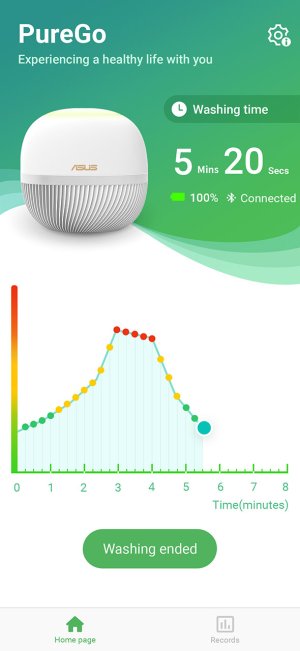Comixbooks
Fully [H]
- Joined
- Jun 7, 2008
- Messages
- 22,023
Follow along with the video below to see how to install our site as a web app on your home screen.
Note: This feature may not be available in some browsers.
We're suppose to wash our veggies? Whoops.Lol, are we now too incompetent to wash veggies without tech?
More importantly, does it have frag harder disco lights that sync with my PC?
My wife gets more paranoid about than I do.We're suppose to wash our veggies? Whoops.
My wife gets more paranoid about than I do.
Why? I'm left handed so I do it as well.chopping stuff left handed!
We're suppose to wash our veggies? Whoops.
Instead of a veggie chemical detector, were gonna need a closest bread line detector soon.

Fruits and Vegetables not applicable to the test results
(Including but not limited to:)
Rich in phytochemicals (Chlorophyll / Anthocyanin); colorants are released in large amounts when washing these fruits and vegetables. This may affect the test results. Okinawa Spinach, Red Amaranth, Strawberry
Rich in phytochemicals or plant spores, which are released in large quantities when washed and may affect the test results. Mushrooms, Cloud Ear Fungus, Seaweed, Enoki Mushroom
Always reminds me of the fan timers in Korea, because of the danger of a fan in a closed room (google 'fan death' for an eye roll).The idea is sound but I'm not sure about the implementation. First, I am curious what sort of things it can detect - if its just detecting any sort of salt or particulate matter then that isn't really helpful - I have a water softener for instance, and if it simply looks for an amount of dissolved solids or salts from ion exchange then everything will always be "dirty". It needs to be able to specifically detect VOC, and the particular families of chemicals that are present in pesticides/herbicides (ie glyphosate residues). Next, I'm curious why it seems to require/suggest immersion in water when many rinse their veg do it piece by piece under running water. If it could be used to just point at/or act as a "handheld scanner" being moved over the skin of the vegetable or something, without immersion in water, that would be preferable to seeing what residue is actually present and if you need to wash it again. Not that this in theory can't work with it floating in the sink, but it could use a lot more water having to get a whole sinkfull every time you want to measure if your'e done with rinsing things yet.
I know it may be kind of strange, but I am thinking it may be a culturally specific thing - kinda like how air quality meters in everything are common in China because well.. the air quality there is abysmal in many places. Maybe its normal in Taiwan to always wash a sink full of vegetables by immersion? But I am curious to see how specific and sensitive it is to pesticide/herbicide residues or is it just "fudging it" with any sort of compound that reacts to the UV beam o whatnot.
LOL, what are you doing, ASUS?
It's basically the same device though, only the claim is not so outlandish. So technically they are not lying as the companies in the video, but the product is just as useless.To be fair, I can't remember what ASUS's ad is claiming and don't feel like watching it again, I think they're just testing what chemicals are left on the produce.
I have fan timers so people don't forget to turn them off (bathrooms). This way I don't have to grease the bearings as often and they last a really long time.Always reminds me of the fan timers in Korea, because of the danger of a fan in a closed room (google 'fan death' for an eye roll).
Although when I double checked it seems to be going away there...
Oh yeah, I'm not saying they were without any use, just the original mandate was for fairly crazy reasons.I have fan timers so people don't forget to turn them off (bathrooms). This way I don't have to grease the bearings as often and they last a really long time.
Hence why I laugh when people say this generation will be so incredibly tech literate. Lol, no. They can push the buttons to get the reaction they want, but they have no clue about how said reactions work.We've apparently successfully trained a couple generations to do what the blinking lights say, and never think or research anything.
They know how to operate the thing, but don't know when the thing is operating them.Hence why I laugh when people say this generation will be so incredibly tech literate. Lol, no. They can push the buttons to get the reaction they want, but they have no clue about how said reactions work.